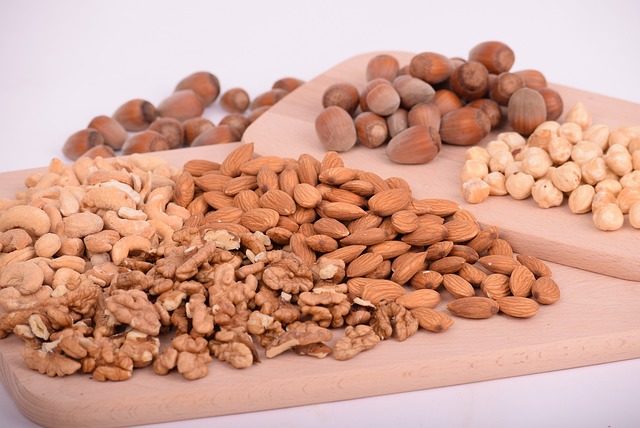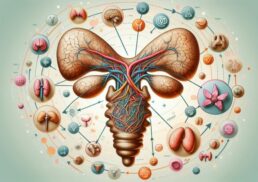Are you aware of the essential nutrient that supports brain function, heart health, and metabolism? Meet choline, an indispensable component that plays a vital role in your overall wellbeing. In this comprehensive guide, we will explore the benefits of choline, its dietary sources, and how you can ensure you’re meeting your nutritional needs. Let’s dive in!
Table of Contents
Key Takeaways
Choline is an essential dietary nutrient with various health benefits, including improved cognitive function and memory, protection of heart health, support for metabolism and weight management.
Animal-based foods such as eggs and dairy products are rich sources of choline. Plant-based sources like tofu, cruciferous vegetables beans & whole grains also contribute to its intake.
Supplements may be used under the advice of a healthcare provider to meet individual needs. Upper intake levels should not be exceeded to prevent potential adverse effects.
The Importance of Choline

Choline is an essential nutrient that plays a crucial role in a wide range of bodily functions. A deficiency in choline can lead to undesirable consequences, such as muscle and liver damage, and even nonalcoholic fatty liver disease.
Given its significance, grasping why choline is vital and comprehending its diverse bodily functions is beneficial.
Why Choline is Essential
Although our bodies can produce a small amount of choline, it is not sufficient to meet our needs. This is why it’s necessary to obtain choline from dietary sources. Choline is involved in a variety of chemical reactions in the body and plays a key role in:
Healthy brain function
Heart health
Liver health
Lipid metabolism
Choline is converted into a neurotransmitter that helps muscles contract, activates pain responses, and supports brain function. It is particularly important for the development of normal brain functioning, being involved in chemical reactions in the body.
Choline deficiency can have several detrimental effects on the body, including muscle damage, liver damage, and the development of nonalcoholic fatty liver disease (NAFLD). Additionally, in animal models, choline deficiency has been associated with an increased incidence of liver cancer. Hence, maintaining sufficient choline intake becomes necessary to prevent such adverse outcomes.
Choline’s Functions in the Body
Choline plays a vital role in maintaining cell membrane integrity, as it is involved in:
the structural integrity and signaling functions of cell membranes
lipid transport and metabolism, which further supports cell membrane integrity
neurotransmitter production, enabling communication between nerve cells and muscle cells
playing a critical role in brain function
Another important function of choline is its role in metabolism, particularly in the metabolism of fats. Choline has been implicated in the re-methylation of homocysteine, which is associated with heart health. Maintaining sufficient choline intake is necessary to uphold these fundamental bodily functions.
Choline Sources: Food and Supplements

Various dietary sources and supplements contain Choline. Additionally, it can be taken as a supplement for its considerable health benefits. Animal-based products such as eggs, liver, fish, and dairy products are rich in choline. Cruciferous vegetables, beans, nuts, seeds, and whole grains are excellent plant-based sources of choline. Choline helps to support a number of important bodily functions..
In addition to food sources, choline is available as a dietary supplement in different forms. We will delve further into these sources.
Choline in Food
Foods rich in choline include:
Eggs
Liver
Fish
Dairy products
Egg yolks, particularly, are a substantial source of choline, containing 680 mg per 100 grams. Plant-based sources of choline, such as tofu, cruciferous vegetables, beans, and whole grains, also contribute to our choline intake.
Note that the cooking techniques employed can alter the choline content in food. Research has demonstrated that the concentration of free choline in food decreases when it is cooked, while the proportion of choline in phosphatidylcholine (PtdCho) increases. Therefore, considering cooking methods when preparing choline-rich foods can help optimize choline intake.
Choline Supplements
Choline supplements are available in different forms, such as:
Choline bitartrate
Phosphatidylcholine
Alpha-GPC
CDP-choline (citicoline)
Acetylcholine
Although the body can absorb choline from supplements, research indicates that the natural choline found in food sources may be more efficiently absorbed than choline from supplements.
The bioavailability of choline from supplements has not been directly compared to other forms of choline. However, choline bitartrate and choline chloride are commonly used forms of choline in dietary supplements. When pondering over choline supplements, consulting a healthcare provider to figure out the apt form and dosage becomes crucial.
Recommended Choline Intake
Choline intake recommendations vary by age and sex, with men requiring 550 mg/day and women requiring 425 mg/day. Most Americans, however, consume less than the recommended amount of choline.
Certain populations, such as pregnant women and individuals with specific genetic alterations, are at a higher risk of choline inadequacy. We will scrutinize the daily choline requirements and populations at risk more thoroughly.
Daily Choline Requirements
The recommended daily choline intake depends on factors like age, sex, and life stage. For example, the daily value for choline is 550 mg for adults and children aged four years and above. It is vital to ascertain that individuals obtain enough choline from their diet or supplements to bolster cognitive function.
Children have varying choline requirements based on their age:
Babies 0-6 months: 125 mg
Infants 7-12 months: 150 mg
Children 1-3 years: 200 mg
Children 4-8 years: 250 mg
Pregnant women are recommended to consume 450 mg of choline per day, while breastfeeding women are recommended to consume 550 mg of choline per day.
At-Risk Populations
Certain populations are at an increased risk of choline inadequacy. Pregnant women, for example, may experience choline deficiency due to the increased demand for choline during pregnancy. Inadequate choline intake during pregnancy may result in:
significant and irreversible changes to fetal brain development
delays in the maturation of neurocircuits
potential effects on cognitive function in children.
Individuals with certain genetic alterations that increase the body’s demand for choline may also be more likely to experience choline deficiency. Genes linked to choline, folate and methionine metabolism have an important role in the pathways of choline utilization. These pathways are essential for many biochemical processes. Genetic polymorphisms in choline and one-carbon metabolic pathways may also modify the dietary requirement for choline and increase the body’s demand for it.
Health Benefits of Choline
Choline offers a variety of health benefits, including:
Improved cognitive function and memory
Protection of heart health
Support for metabolism and weight management
Reduced risk of pregnancy complications
Alleviation of cystic fibrosis symptoms
Let’s scrutinize these benefits more thoroughly, as discussed by Smith et al.
Cognitive Function and Memory
Choline is essential for brain development and has been linked to improved cognitive functioning and memory, particularly in older adults. Studies have shown that choline supplementation can enhance verbal memory and improve brain function. Additionally, choline deprivation during early development can result in compromised cognitive function. These findings suggest that choline may promote neuroprotection over time and support cognitive function.
Choline intake levels in the past have been linked to a reduced size of white matter hyperintensity. This is an indication of small-vessel disease in the brain. Therefore, maintaining sufficient choline intake is crucial for safeguarding brain health and minimizing the risk of Alzheimer’s disease.
Heart Health
Higher dietary choline intake has been associated with a lower risk of heart disease and stroke. Choline and betaine are involved in:
reducing inflammation in the body
lowering homocysteine concentrations
interacting with gut bacteria to produce a compound that can affect blood clotting
As a result, it is essential to uphold sufficient choline levels to cater to heart health preservation.
However, the role of choline in cardiovascular health is complex and not fully understood. Higher dietary intakes of phosphatidylcholine have been associated with a heightened cardiovascular disease risk. More research is needed to fully understand the relationship between choline intake and cardiovascular health.
Metabolism and Weight Management
Choline may help with weight management by:
Metabolizing fats
Reducing BMI and leptin levels
Stimulating the breakdown of fat for energy
Limiting fat and cholesterol accumulation in the body
Research has demonstrated that choline supplementation can have the following benefits:
Reduce body mass without any adverse effects on biochemical levels or static strength
Improve body composition and lower body fat percentage
Prevent obesity and hyperglycemia associated with choline-deficient diets
To conclude, choline seems to have a part in weight regulation.
Pregnancy and Choline
Adequate choline intake during pregnancy may reduce the risk of complications like preeclampsia and support healthy fetal development. Insufficient choline consumption during pregnancy can result in complications, including negative impacts on the brain development and function of the offspring.
Choline supplementation during pregnancy has been shown to reduce the risk of preeclampsia and improve pregnancy outcomes. Furthermore, adequate levels of choline are believed to play a protective role in infant brain development. Maintaining adequate choline intake during pregnancy is paramount for the wellbeing of both the mother and the developing infant.
Learn more, visit Choline Supplementation in Pregnancy: Current Evidence and Implications.
Cystic Fibrosis Symptoms
Choline supplementation has been shown to improve lung function in individuals with cystic fibrosis. Cystic fibrosis is a genetic disorder that affects the lungs and digestive system, characterized by thick, sticky mucus that can clog the lungs and cause breathing difficulties.
Studies have demonstrated that choline levels in cystic fibrosis patients are linked to lung function and inflammation. Specifically, lower levels of choline in the plasma have been found to be connected to reduced lung function in CF patients.
Moreover, choline supplementation has been shown to improve lung function and liver health in CF patients. Correcting choline deficiency is a key factor in managing cystic fibrosis and can have beneficial effects on the symptoms of this condition.
Potential Risks and Side Effects of Choline
While choline offers numerous health benefits, excessive consumption can lead to side effects and potential health risks. It is important to be aware of these risks and maintain a balanced intake of choline to avoid any adverse effects.
Upper Intake Level
Upper intake levels, which are a part of dietary reference intakes, have been established for healthy children and adults, except infants, to prevent potential adverse effects from excessive intakes of choline. These levels are designed to help individuals avoid potential negative effects such as fishy body odor, liver toxicity, and an increased risk of cardiovascular disease.
It’s worth noting that these upper intake levels are not applicable to those receiving high doses of choline under medical watch. Always consult with a healthcare professional before initiating any new supplement regimen, particularly if you belong to an at-risk population or have specific health concerns. For more information, you can also refer to the Office of Dietary Supplements.
Side Effects and Precautions
Side effects of high choline intake may include sweating, fishy body odor, diarrhea, vomiting, and worsening bladder control, particularly when consumed in doses above 3.5g/day. Excessive intake of choline has also been linked to liver toxicity and increased serum alanine aminotransferase concentration, which is indicative of liver damage.
It is important to consult with a healthcare provider before taking choline supplements, particularly if you belong to an at-risk population or have specific health concerns. By keeping a balanced choline intake and adhering to professional advice, you can relish the numerous health benefits choline provides without encountering undesired consequences.
Choline and Your Diet: Meeting Nutritional Needs
Meeting your nutritional needs for choline through a balanced diet is recommended by the Food and Nutrition Board. Incorporating choline-rich foods into your diet and considering supplements when necessary can help you maintain optimal choline levels and reap the benefits of this essential nutrient.
Tips for Increasing Choline Intake
To boost choline intake, make sure to include choline-rich foods in your diet, like eggs, fish, dairy products, and cruciferous vegetables. Simple ways to include eggs in your daily meals include preparing a frittata, scrambling eggs for stir-fries, or adding boiled eggs to salads and sandwiches. Remember that cooking methods can affect the amount of choline in food, so be mindful of how you prepare your choline-rich meals.
For those following a vegetarian or vegan diet, some excellent sources of choline include:
Tofu
Cruciferous vegetables (such as broccoli, Brussels sprouts, and cauliflower)
Beans
Whole grains
By incorporating a variety of these choline-rich foods into your daily meals, you can ensure you’re getting enough choline, meeting your nutritional needs for this essential nutrient.
When to Consider Supplements
In some cases, it may be necessary to consider choline supplements to ensure adequate intake. If you belong to an at-risk population, such as pregnant women or individuals with specific genetic alterations, or if you have specific health concerns, it is important to consult a healthcare provider before taking choline supplements.
Choline supplements come in varied forms, and it’s critical to identify the most suitable form and dosage for your personal requirements. By working closely with a healthcare professional, you can develop a personalized supplementation plan that best supports your overall health and wellbeing.
Summary
In conclusion, choline is an essential nutrient that plays a crucial role in brain development, heart health, metabolism, and more. Ensuring adequate choline intake through a balanced diet and supplements when necessary can significantly contribute to your overall health and wellbeing. By understanding the importance of choline, incorporating choline-rich foods into your diet, and consulting with a healthcare provider when needed, you can optimize your choline levels and reap the numerous health benefits this amazing nutrient has to offer.
Frequently Asked Questions
What does choline do for the body?
Choline is an essential nutrient that helps with important body functions such as maintaining a healthy nervous system, regulating memory and mood, and forming the membranes around cells. It also aids in reducing inflammation associated with asthma, decreasing fatty liver disease risk and metabolizing homocysteine.
Who should not take choline supplements?
People with bipolar disorder and those who are pregnant or breastfeeding should not take choline supplements.
Should you take choline daily?
Based on the recommendation from the Food and Nutrition Board, choline should be taken daily at 425 mg for adult women and 550 mg for adult men. Pregnant and lactating people should take 450 and 550 mg respectively. Taking high doses of choline is possibly unsafe, so it’s important to stay within the recommended range.
What are the main sources of choline in the diet?
Eggs, fish, dairy products, cruciferous vegetables, tofu, beans, and whole grains are some of the main sources of choline in the diet.
How much choline should I consume daily?
It is recommended that men should consume 550 mg of choline daily and women should consume 425 mg.









